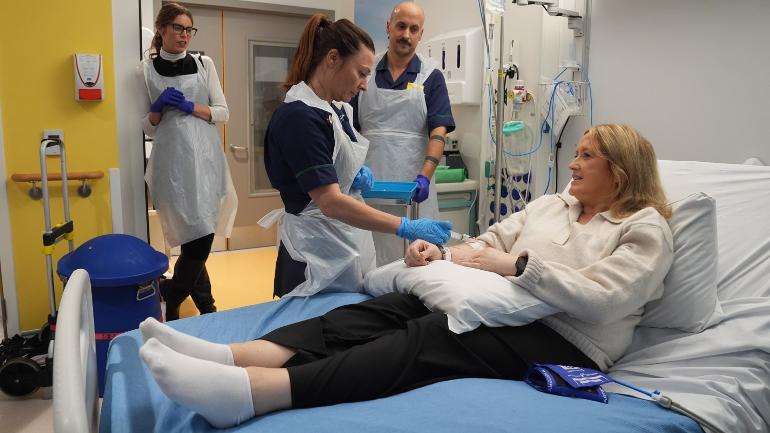Katie Tinkler, who is taking part in the trial at University College Hospital in London, said the treatment could be “life-changing”
LUCY NORTH/PA
Lupus patients given hope of remission in groundbreaking trial
Three patients with the condition, which can cause severe joint pain and fatigue, are receiving treatment that could end the lifelong need to take drugs
Katie Tinkler was diagnosed with lupus at 20. Now 50, she has spent years in “extreme” and “excruciating” joint pain, having to give up work as a fitness instructor because of the autoimmune condition.
But now Tinkler has a chance of her condition going into remission — thanks to a groundbreaking gene therapy trial on the NHS.
She is one of three patients to receive CAR T-cell therapy, which researchers hope can remove the need for lupus patients to take lifelong drugs.
Until now, CAR T-cell therapy in Britain had been used only in cancer patients but scientists believe that the treatment can also tackle diseases such as lupus and multiple sclerosis.
The treatment works by genetically modifying cells to enable the body’s immune system to recognise and attack problem cells, offering people a possible cure.
“If this works, it’s life-changing,” said Tinkler, who has three children. She added that she was “beyond excited” to take part in the NHS trial. “Up until now, there’s never been anything for lupus that is a possible cure. The dream is to be lupus-free — that would be phenomenal.”
The trial, led by University College London Hospitals NHS Foundation Trust (UCLH) and University College London (UCL), has treated three patients with the most serious form of lupus.
Lupus affects about 69,000 people in the UK, mostly women. In lupus patients the immune system mistakenly attacks healthy tissue, meaning that severity and symptoms can vary drastically between patients.
Symptoms often include joint pain, skin problems, fatigue and inflammation of major organs. People often take drugs, ranging from ibuprofen to steroid tablets and injections, or other immunosuppressant or biological medicines, for life.
Results from trials indicate that the therapy is promising. In Germany, patients who underwent CAR T-cell therapy more than a year ago are in remission and do not need to take lupus drugs.
It is not without risk, however. People undergoing CAR T require a ten-day hospital stay and are warned of possible side-effects, such as their immune system being susceptible to infection for several weeks or another condition that causes the immune system to go into overdrive.
Tinkler, whose lupus has got worse over the last decade, said: “When the professor phoned me and said, ‘We’re bringing a trial here, would you be interested?’ Oh my gosh, I jumped at it. I feel that my body’s getting tired. I’ve had this for 30 years, it’s being attacked from inside 24/7.
“My body’s struggling with it all now, and it’s definitely got worse over the last decade… so I just feel any opportunity that I can have is great.”
Professor Ben Parker, the consultant rheumatologist who is leading the study at Manchester Royal Infirmary, told PA: “We are delighted to be the first to deliver this fantastic research in the UK, which we hope will revolutionise treatment for patients with high-risk lupus, that could potentially lead to a cure for the disease.
“Lupus is a disease that requires lifelong medication, but this therapy has the potential to change that, which is incredibly exciting. This groundbreaking new therapy marks a significant milestone in our research into lupus.”
